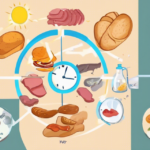
Hello, Family! 🌟
Today, let’s delve into a topic that might not always get the spotlight it deserves: hypoglycemia and its often-overlooked consequences. 🌡️
We often associate high glucose levels with diabetes, but what about the impacts of fluctuating blood sugar? Did you know that frequent spikes in glucose might lead to long-standing health issues?
Here’s what happens in our bodies when glucose levels soar:
1️⃣ Insulin Resistance: As glucose spikes, insulin rises to manage the excess. Over time, this can lead to insulin resistance, making your body less effective at processing sugar, which often results in… you guessed it—more glucose! This vicious cycle can set the stage for metabolic dysfunction.
2️⃣ Oxidative Stress: Rapid increases in glucose can lead to the overproduction of reactive oxygen species (ROS)—the infamous free radicals that wreak havoc within our cells. Think of them as unwanted guests throwing a wild party that damages cellular structures and DNA, leading to inflammation.
3️⃣ Advanced Glycation End Products (AGEs): Elevated glucose can bind to proteins in our tissue, essentially “glycating” them. This irreversible linking can cause collagen to become rigid and less effective, contributing to premature aging and metabolic diseases. It’s all about how we treat our body’s machinery!
4️⃣ Endothelial Dysfunction: High glucose affects the endothelium—the lining of our blood vessels—leading to less production of nitric oxide (NO), a molecule crucial for blood vessel health. This leads to increased risk of hypertension and cardiovascular diseases. Are we on the verge of a silent epidemic of cardiovascular risk?
5️⃣ Inflammation: The combination of insulin resistance, oxidative stress, and AGEs creates an internal environment ripe for chronic inflammation—a precursor for numerous health concerns, from heart disease to Alzheimer’s.
So, what can we do? Here are ✅ practical strategies to mitigate the damage:
✨ Monitor Your Glucose Levels: Use continuous glucose monitors (CGMs) to keep track of your body’s response to meals. Knowledge is power!
✨ Opt for Low Glycemic Foods: Focus on whole foods with low glycemic indexes that cause gradual increases in blood sugar, rather than sharp spikes.
✨ Incorporate Fiber: Fiber is your friend! It slows down carbohydrate digestion, leading to more stable blood sugar levels.
✨ Exercise Regularly: Physical activity post-meal can help lower blood sugar levels while improving insulin sensitivity.
✨ Stay Hydrated: Proper hydration can also help your kidney manage glucose reabsorption efficiently.
The bottom line? Be mindful of what you eat, how it affects your body, and take steps to maintain your health proactively. Remember, what seems like a harmless spike could lead to a series of detrimental effects over time. 💡
Let’s keep the conversation going! What are your strategies for managing your glucose levels? Share your thoughts below! ⬇️
Hypoglycemia #BloodSugarManagement #HealthAwareness #Nutrition #Wellness #ChronicInflammation #LinkedInLearning
Sources:

